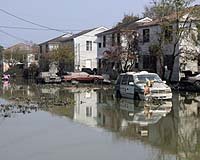| . |  |
. |
|
Paris (AFP) March 5, 2010 Europe's system for industrial carbon quotas has enriched the continent's biggest polluters, with ten firms together reaping permits for 2008 alone worth 500 million euros, a new report revealed. Dominated by steel and cement makers, the same "carbon fat cats" stand to collect surplus CO2 permits that -- at current market rates -- could be worth 3.2 billion euros (4.3 billion dollars) by 2012, it said. This is roughly equivalent to the entire EU investment in renewable energy and clean technology under its economic recovery plan, according to Sandbag, a non-profit group in Britain that analyses carbon market policy. "Emissions trading is meant to be the central policy for cutting CO2 levels," said Anna Pearson, Sandbag's top policy analyst. "The fact that companies are able to make large sums of money for doing nothing highlights that the trading scheme must be reformed and EU climate change target strengthened." Under the Emissions Trading Scheme (ETS), the European Union allocates carbon polluting allowances to member states to meet obligations laid out in the UN's Kyoto Protocol, for which the first commitment period runs through 2012. The states then assign quotas to the industries that belch the most CO2 into the atmosphere. Companies that emit less than their allowance can sell the difference on the market to companies that exceed their limits, thus providing -- in theory -- a financial carrot to everyone to become greener. But the energy, steel and cement sectors that dominate the system, hit by the global crunch, are emitting less CO2 than forecast, which means surplus carbon permits are flooding the market. Among the top ten beneficiaries, steelmaker ArcelorMittal collected more than 40 percent of the 2008 excess permits, reported Sandbag. French cement giant Lafarge got about 12 percent, with Tata steel group subsidiary Corus and Swedish steel maker SSAB-Svenskt Stal each claiming about 10 percent. Even if the permits are not directly resold for profit, the value will still remain on the companies' books, rising or falling with the market. Most of the permits were generated simply because the companies were allocated more free permits than they wound up using, according to the report. "Little or no actual 'effort' toward emissions reductions need have taken place, yet these companies will be able to literally bank the profits," it said. The price of a tonne of carbon dioxide (CO2) or its equivalent has fallen sharply over the last 18 months. After peaking at nearly 30 euros (38 dollars) in mid-2008, CO2 is currently trading at about 13 euros, according to BlueNext, one of several European carbon exchanges. Viewed narrowly, the recession-driven drop in CO2 emissions helps the environment. But low carbon prices give businesses little incentive to develop and install new technologies to slash future emissions.
Share This Article With Planet Earth
Related Links Climate Science News - Modeling, Mitigation Adaptation
 Katrina victims seek to sue greenhouse gas emitters
Katrina victims seek to sue greenhouse gas emittersWashington (AFP) March 3, 2010 Victims of Hurricane Katrina are seeking to sue carbon gas-emitting multinationals for helping fuel global warming and boosting the devastating 2005 storm, legal documents showed Wednesday. The class action suit brought by residents from southern Mississippi, which was ravaged by hurricane-force winds and driving rains, was first filed just weeks after the August 2005 storm hit. "The pla ... read more |
|
| The content herein, unless otherwise known to be public domain, are Copyright 1995-2010 - SpaceDaily. AFP and UPI Wire Stories are copyright Agence France-Presse and United Press International. ESA Portal Reports are copyright European Space Agency. All NASA sourced material is public domain. Additional copyrights may apply in whole or part to other bona fide parties. Advertising does not imply endorsement,agreement or approval of any opinions, statements or information provided by SpaceDaily on any Web page published or hosted by SpaceDaily. Privacy Statement |